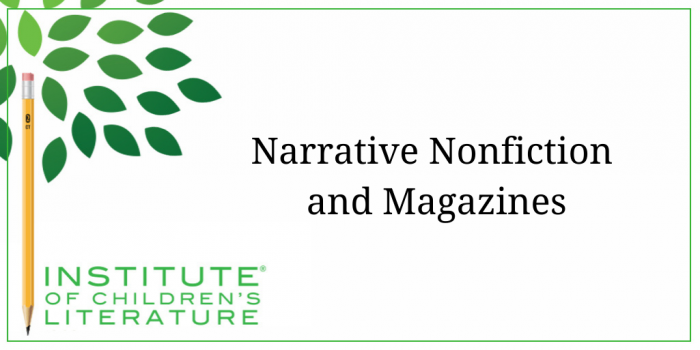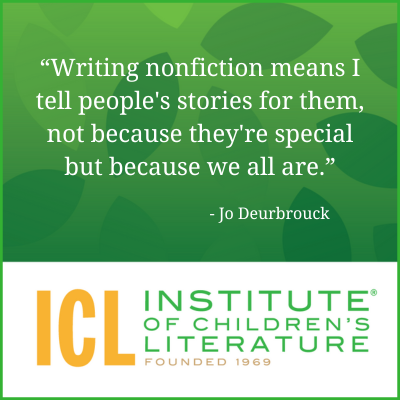1000 N. West Street #1200, Wilmington, DE 19801
© 2024 Direct Learning Systems, Inc. All rights reserved.
Beginning Tuesday, July 22, 2025 at 10 PM CT through Wednesday, July 23, 2025 at 4 AM CT, we will be performing scheduled maintenance to update our website.

If you’re interested in trying your hand at narrative nonfiction, there are options beyond massively researched full-length books. Some children’s magazines buy narrative nonfiction in the form of biographical sketches, profiles of contemporary figures, and anecdotal stories of researchers and scientists dealing with the natural world. And if you favor telling your own story, the Chicken Soup Anthologies and nostalgia magazines are full of the specific type of narrative nonfiction known as memoir. So let’s look at these.
We’ll begin with the specific nonfiction needs of two well-known children’s magazines. Spider magazine’s guidelines, for instance, include the words “We look for kid-friendly nonfiction shaped into an engaging narrative” and say they are interested in articles about kids doing amazing things. That would definitely be narrative nonfiction as it would tell us the story of the kids and the amazing things they do. A piece like that would include quotes from the subject and possibly quotes from other people about the subject, but at its heart it would be the story of a real-life kid doing something that would interest readers.

Clearly to write narrative nonfiction for magazines, you must deal with short word counts and the high demand of meticulous research. Children’s magazines can be among the most demanding publishers when it comes to research. Many don’t want to see online sources (unless you’re dealing with scans of primary sources like historical journals or historical newspapers). Magazines are demanding for all their nonfiction, but it can be especially tricky with narrative nonfiction where it might be tempting to make up a few details of weather or setting to make the narrative feel more immediate. Remember, you can only include details you have research to back up.
Memoir is a specific type of narrative nonfiction. It is akin to autobiography but memoirs tend to be more emotional and intimate than a general autobiography. Memoir almost always has a theme that brings a sense of purpose to the recounting. Chicken Soup for the Soul is a famous publisher of this type of narrative nonfiction. Chicken Soup for the Soul essays are recounting of specific events intended to elicit a specific reaction in the reader. The “recounting of specific events” makes this narrative nonfiction and memoir. Chicken Soup pieces always fit a general theme for the edition of the anthology, but not all memoir writing adheres to a predefined theme by the publisher. Many memoir magazines are open to all sorts of personal stories as long as they do feel purposeful.

For instance, if you remember you were sharing a soft drink with a friend when the event happened, be careful if you decide to mention a specific soft drink. It is important that the specific soft drink was available then in that location and that might take a moment to confirm. Our memories can sometimes lead us astray, causing mistakes that readers will catch, mistakes that will reflect badly on you. Readers who catch mistakes in this kind of piece seem to love writing in to point them out, so it’s worthwhile to read through your piece looking for elements that might need a little research and confirmation.
The short word counts of magazine and anthology memoir are best met by focus. Focus on the very specific event you’re recounting and on the purpose of the recounting. Let that guide you so that you don’t allow extraneous detail creep in. If you’re recounting the story of getting a hunk of coal for Christmas when you were six, you won’t need to include the life story of all your siblings or tales of dozens of other Christmases. You’ll focus on the event, including just enough to make the event real and meaningful for the reader.
You may have noticed that the memoir markets aren’t for children. This is usually the case. Children tend to be uninterested in the emotional retelling of events of the past unless they have a tie to something historically significant. A nonfiction piece on meeting a president when you were a child might work for a children’s magazine (for instance) if the meeting was somehow unexpected and probably longer than a simple handshake as the president rushed by a line of admirers.
Equally, a memoir from the child of an astronaut from an early Apollo mission that experienced trouble, recounting the feelings about having such a parent might work for a magazine, because the event would be considered important historically. But do keep in mind that it’s not easy to capture the interest of a young reader in the memoirs of an adult who isn’t related to them. But nostalgia magazines and anthologies thrive on stories that are more normal and connect with adult readers who’ve had similar experiences. So when it comes to personal narrative nonfiction, there is a market, but sometimes you have to have a broader view.
With over 100 books in publication, Jan Fields writes both chapter books for children and mystery novels for adults. She’s also known for a variety of experiences teaching writing, from one session SCBWI events to lengthier Highlights Foundation workshops to these blog posts for the Institute of Children’s Literature. As a former ICL instructor, Jan enjoys equipping writers for success in whatever way she can.
1000 N. West Street #1200, Wilmington, DE 19801
© 2024 Direct Learning Systems, Inc. All rights reserved.
1000 N. West Street #1200, Wilmington, DE 19801
© 2024 Direct Learning Systems, Inc. All rights reserved.
1000 N. West Street #1200, Wilmington, DE 19801
© 2024 Direct Learning Systems, Inc. All rights reserved.
1000 N. West Street #1200, Wilmington, DE 19801
© 2025 Direct Learning Systems, Inc. All rights reserved.
1000 N. West Street #1200, Wilmington, DE 19801
©2025 Direct Learning Systems, Inc. All rights reserved. Privacy Policy.
3 Comments